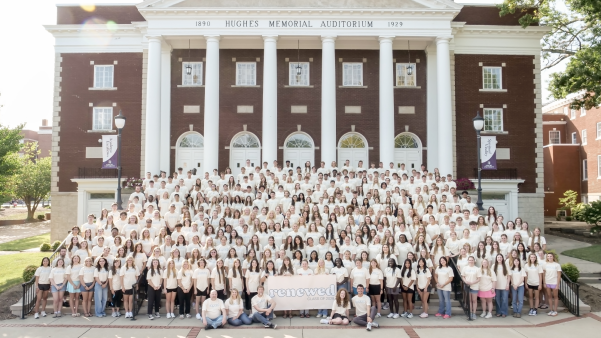If both blog posts hadn't caught my attention on the same day, I don't think I would have seen the connection. The first, from the Chronicle of Higher Education, noted that female graduate students were significantly less likely than their male counterparts to ask for full reimbursement for conference-related travel expenses. "Women Really Don't Ask," author Minerva Cheevy observed. The second, from the blog Momastery, celebrated all of the people who rallied around a mother facing a serious health scare. "I do have a village, and I need them," the stricken mom, Glennon Doyle Melton, wrote. "I need them. Like folks traveling at night need stars. We need people like we need light."
So, what's the connection?
I know all too well the fear of asking. I recently drove to a faraway academic conference, rather than flying, because I needed to bring along my nursing infant son—and my husband (to help with the baby), and our daughter (who couldn't very well be left home alone). Adding up the mileage, my travel costs were well above the standard amount allotted for faculty members at my institution. Like the women in Cheevy's article, though, I was inclined to ask only for the standard amount and cover the rest out of pocket.
I also happen to chair the committee that approves travel funding requests. I knew that our pool of funds was up this year, while requests were down. I knew that if the "extra" funds weren't used within the fiscal year, they would be wasted; we can't, by law, roll them over to the next year. I knew that seeking additional funds would not affect consideration of my future requests in any way.
And I still hesitated to ask for full reimbursement! My own money already spent on the trip, I delayed submitting my request and dithered about the amount. If I asked for too much, would the fund run dry? What if someone traveling later in the year unexpectedly racked up even higher bills? Was it fair to ask for more money because I brought my family, a "personal" rather than "professional" expense?
Here, I think, is where the insights from the other article come in. Women tend to have a village mentality, acutely aware of interdependence. We want to direct resources where they're needed most. Occasionally, we send up a flare and call those resources in for ourselves. More often, we try to do our bit to keep everyone else's needs met. In either scenario, we're constantly attuned to the flow of supply and demand, hesitant to upset the system by asking too much, or giving too little, or making any miscalculated move.
This awareness of interdependence is wise and beautiful. Taken too much to heart, it can also be foolish and crippling.
Consider two widows Jesus describes in Luke. The one in Luke 21:1-4 puts her two mites, all the money she has to live on, in the temple treasury. Jesus praises her selfless generosity. The widow in Luke 18:1-8, by contrast, isn't so selfless. She begs and begs a hard-hearted judge for justice, and he finally gives it to her, simply to shut her up. Jesus tells this story as a parable about prayer, teaching that if a cruel judge will eventually respond to an insistent request, surely God will grant the petitions of his people.
The model of the generous widow is seductively easy to follow, at least as an internal monologue. It prompts the voice inside your head to say, "If I just keep giving, with no thought of myself, God will be happy with me." I'm not suggesting that this is the right application of the passage, or that most people wouldn't do well to be more financially generous. But I think both the familiarity and the dangers of this mantra are obvious. How often have you said "yes" to a request when your weary mind screamed "no"? How often have you skipped yoga, or a cup of coffee, or whatever regenerates you in order to squeeze in another load of laundry, another beyond-the-job-description task at work? How often have you done these things just today?
The model of the begging widow, on the other hand, hardly seems like it ought to be followed. Hers is often called the parable of the "importunate" widow, a word meaning persistent to the point of annoyance. I certainly don't want anyone to think of me that way! But, what does this widow actually do wrong? Her cause is just. She asks for what she deserves and won't take a snub for an answer. The judge only finds her annoying because he's a jerk, a man "who neither feared God nor cared about men." Maybe she's not such a bad model after all.
Now, what's missing from both of these stories is the village, the rest of the social network in which these widows were embedded. Widows in Jesus' day were often cut off from society, which is why they, and orphans, received special concern from the early church. Those of us who don't share their plight should be grateful—but we also shouldn't hesitate to be women who ask, for fear that someone in our network might be inconvenienced.
I finally decided that my village would not suffer if I requested full travel reimbursement. In fact, my village would suffer if I didn't. Driving to the conference had cost my family money (as well as a fair amount of sanity). Wasting travel funds would make my department look bad. And setting a precedent of treating a nursing mother's unique expenses as her "personal" problem would be a disservice to every future mother at my institution. I owed it to all of these people to set false selflessness aside and be just a tiny bit importunate. I had to ask.
Elesha Coffman is assistant professor of church history at the University of Dubuque Theological Seminary.









